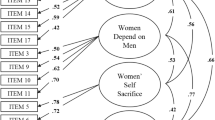Abstract
A cross-cultural study of adolescent sex-role stereotypes illustrates possible methodological solutions to problems in measuring sex-role identification. A study was conducted with a sample of Hong Kong Chinese adolescents to develop a rating scale that would (1) define the sex-role stereotypes held by adolescents in Hong Kong and (2) serve as a measure of identification with sex-role stereotypes valid for use with Hong Kong samples. The Chinese Sex-Role Inventory (CSRI) was constructed, therefore, following the procedures of Bem in the creation of the Bem Sex Role Inventory. Creation of the CSRI illustrates the feasibility and value of using such procedures in research with adolescents in any society.
Similar content being viewed by others
References
Baruch, G. K. Sex-role stereotyping, the motive to avoid success and parental identification. Sex Roles, 1975, 1, 303–309.
Bem, S. The measurement of psychological androgyny. Journal of Consulting and Clinical Psychology, 1974, 4, 155–162.
Block, J. H. Conceptions of sex role: Some cross-cultural and longitudinal perspectives. American Psychologist, 1973, 28, 512–526.
Douvan, E. Sex role learning. In J. C. Coleman (Ed.), The school years. London: Methuen, 1979.
Dwyer, C. A. Influences of children's sex role standards on reading and arithmetic achievement. Journal of Educational Psychology, 1974, 66, 811–816.
Education Department, Annual Summary, 1975–76. Hong Kong: Author, 1976.
Education Department, Annual Summary, 1976–77. Hong Kong: Author, 1977.
Emmerich, W., Goldman, K. S., & Shore, R. E. Differentiation and development of social norms. Journal of Personality and Social Psychology, 1971, 18, 323–353.
Field, C. E., & Baber, F. M. Growing up in Hong Kong. Hong Kong: Hong Kong University Press, 1973.
Fox, L. H., Fennema, E., & Sherman, J. Women and mathematics: Research perspective for change. (NIE Paper in Education and Work: No. 8) Washington, D.C.: U.S. Department of Health, Education and Welfare, November 1977.
Gold, D., & Berger, C. Problem solving performance of young boys and girls as a function of task appropriateness and sex identity. Sex Roles, 1978, 4, 183–193.
Hong Kong By-Census: Basic tables 1976. Hong Kong: Census and Statistics Department, 1976.
Hong Kong Census, 1971. Hong Kong: Census and Statistics Department, 1971.
Kagan, J. Acquisition and significance of sex-typing and sex role identity. In M. L. Hoffman & L. W. Hoffman (Eds.), Review of Child Development Research (Vol. 1). New York: Russell Sage, 1964. (a)
Kagan, J. The child's sex role classification of school objects. Child Development, 1964, 35, 1051–1056. (b)
Keyes, S. Sex differences in cognitive abilities and sex-role stereotypes in Hong Kong Chinese adolescents. Sex Roles, 1983, 9, 853–870.
Kohlberg, L. A cognitive-developmental analysis of children's sex-role concepts and attitudes. In E. E. Maccoby (Ed.), The development of sex differences. Stanford: Stanford University Press, 1966.
Kohlberg, L., & Zigler, E. The impact of cognitive maturity on the development of sex-role attitudes in the years 4 to 8. Genetic Psychology Monographs, 1967, 75, 89–165.
Maccoby, E. E., & Jacklin, C. N. The psychology of sex differences. Stanford: Stanford University Press, 1974.
McCracken, J. H. Sex typing of reading by boys attending all-male classes. Developmental Psychology, 1973, 8, 148.
Mischel, W. Sex-typing and socialization. In P. H. Mussen (Ed.), Carmichael's manual of child psychology (Vol. 2, 3rd ed.). New York: Wiley, 1970.
Mussen, P. H. Early sex-role development. In D. A. Goslin (Ed.), Handbook of socialization research. Chicago: Rand McNally, 1969.
Nash, S. C. The relationship among sex-role stereotyping, sex-role preference and sex differences in spatial visualization. Sex Roles, 1975, 1, 15–32.
Nash, S. C. Sex role as a mediator of intellectual functioning. In M. A. Wittig & A. C. Peterson (Eds.), Sex-related differences in cognitive functioning. New York: Academic Press, 1979.
Parish, T. S., & Bryant, W. T. Mapping sex group stereotypes of elementary and high school students. Sex Roles, 1978, 4, 135–140.
Sears, R. R., Rau, L., & Alpert, R. Identification and childrearing. Stanford: Stanford University Press, 1965.
Sherman, J. A. Problems of sex differences in space perception and aspects of intellectual functioning. Psychological Review, 1967, 74, 290–299.
Sherman, J. A. Sex-related cognitive differences: An essay on theory and evidence. Springfield, Ill.: Charles Thomas, 1978.
Silvern, L. E. Children's sex-role preferences: Stronger among girls than boys. Sex Roles, 1977, 2, 159–171.
Silvern, L. E. Masculinity-femininity in children's self-concepts: The relationship to teachers' judgments of social adjustment and academic ability, classroom behavior, and popularity. Sex Roles, 1978, 4, 929–949.
Spence, J. T., & Helmreich, R. L. Masculinity and femininity. Austin: University of Texas Press, 1978.
Stein, A. H., & Bailey, M. M. The socialization of achievement orientation in females. Psychological Bulletin, 1973, 80, 345–366.
Stein, A. H., & Smithell, J. Age and sex differences in children's sex-role standards about achievement. Developmental Psychology, 1969, 1, 252–259.
Ullian, D. Z. The development of conceptions of masculinity and femininity. In B. Lloyd & J. Archer (Eds.), Exploring sex differences. London: Academic Press, 1976.
Wolf, M. Women and the family in rural Taiwan. Stanford: Stanford University Press, 1972.
Wolf, M., & Witke, R. (Eds.). Women in Chinese society. Stanford: Stanford University Press, 1975.
Author information
Authors and Affiliations
Additional information
This report is based on a doctoral dissertation submitted to the faculty of Harvard University. The research was supported by a National Research Service Award, National Institutes of Health Grant 5-T32-MH14088, awarded to Beatrice and John Whiting to support graduate research in cross-cultural child development.
Rights and permissions
About this article
Cite this article
Keyes, S. Measuring sex-role stereotypes: Attitudes among Hong Kong Chinese adolescents and the development of the Chinese sex-role inventory. Sex Roles 10, 129–140 (1984). https://doi.org/10.1007/BF00287752
Issue Date:
DOI: https://doi.org/10.1007/BF00287752




